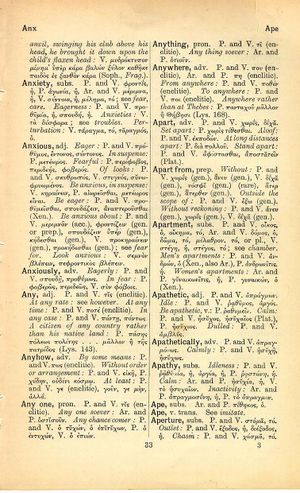ape: Difference between revisions
From LSJ
Ῥίζα γὰρ πάντων τῶν κακῶν ἐστιν ἡ φιλαργυρία → Root of all the evils is the love of money (Radix omnium malorum est cupiditas)
(D_1) |
(Gf-D_1) |
||
| Line 1: | Line 1: | ||
{{Woodhouse1 | {{Woodhouse1 | ||
|Text=[[File:woodhouse_33.jpg|thumb|link= | |Text=[[File:woodhouse_33.jpg|thumb | ||
|link={{filepath:woodhouse_33.jpg}}]]'''subs.''' | |||
Ar. and P. [[πίθηκος]], ὁ. | Ar. and P. [[πίθηκος]], ὁ. | ||
| Line 12: | Line 13: | ||
}} | }} | ||
{{Gaffiot | {{Gaffiot | ||
|gf=<b>ape</b> [arch.], arrête, empêche : P. Fest. 22, 17 || <b>apet</b>, <b>apēre</b> Gloss. | |gf=<b>ape</b> [arch.], arrête, empêche : P. Fest. 22, 17 || <b>apet</b>, <b>apēre</b> Gloss.||<b>apet</b>, <b>apēre</b> Gloss. | ||
}} | }} | ||

